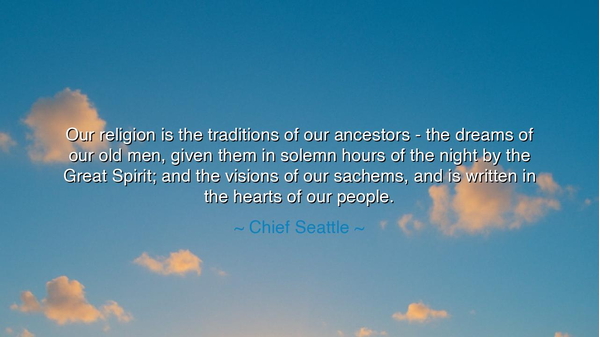
Our religion is the traditions of our ancestors - the dreams of
Our religion is the traditions of our ancestors - the dreams of our old men, given them in solemn hours of the night by the Great Spirit; and the visions of our sachems, and is written in the hearts of our people.






The words “Our religion is the traditions of our ancestors – the dreams of our old men, given them in solemn hours of the night by the Great Spirit; and the visions of our sachems, and is written in the hearts of our people,” were spoken by Chief Seattle, the great Duwamish and Suquamish leader, whose wisdom bridged the world of his people and the encroaching world of the settlers. These words, born from the depths of his culture and the reverence of his people for life and spirit, are not merely a declaration of faith—they are a testament to belonging, to memory, and to the sacred bond between humanity, the earth, and the unseen divine. Through them, Chief Seattle speaks not only for his tribe but for all humankind, reminding us that true religion is not confined to stone temples or written laws—it is the living spirit of tradition, carried in the hearts of a people who remember who they are.
In the ancient rhythm of his words lies a profound truth: that religion is not something external, imposed from above, but something inherited through the ages, whispered through stories, rituals, and dreams. The “dreams of our old men” and the “visions of our sachems” are not idle fantasies; they are the spiritual language of wisdom, a bridge between the human and the divine. To the people of Chief Seattle’s world, the Great Spirit was not a distant god, but the life that moved through wind, river, mountain, and heart. Their faith was not learned from scriptures, but lived through reverence—through gratitude for the earth, respect for ancestors, and harmony with all living things.
Chief Seattle’s words were born in a time of loss and upheaval, when his people’s lands were being taken and their ways threatened. Yet even amid sorrow, his tone was not of hatred, but of dignity and remembrance. He spoke these words in 1854, addressing the new world that was rising around him, reminding those who would listen that his people’s faith could not be destroyed by conquest, for it was not carved on monuments, but “written in the hearts of our people.” This was his prophecy and his defiance: that the spirit of a people cannot die as long as they carry their traditions within.
The lesson of these words finds echo in the story of many peoples. Consider the Hebrews in exile, who, though torn from their homeland, carried their faith through song and story, preserving it across centuries until they could return. Or think of the First Nations of North America, who, through oppression and displacement, still passed down their dances, their prayers, their languages—each act of remembrance a flame kept alive in darkness. Chief Seattle’s truth is universal: that identity and faith endure not through wealth or power, but through memory—through the courage to keep dreaming the dreams of one’s ancestors.
Yet this wisdom does not belong to the past alone; it is a warning to the present. In the modern age, when people rush through life unrooted, chasing fleeting comforts, we risk forgetting that which gives meaning to our days. We build machines that outthink us, but forget to listen to the “visions” within us. We worship progress but lose touch with the Great Spirit—the living unity of all creation. Chief Seattle’s words invite us back into balance, reminding us that true civilization is not measured by technology or wealth, but by reverence—for the land, for the past, and for the sacred pulse of life that connects all beings.
Let us then take heed of his wisdom. To live with tradition is not to dwell in the past, but to carry the past like a lamp, guiding us through the unknown. Let each person remember the stories of their ancestors, the values that shaped their lineage, the quiet teachings of elders who dreamed of better days. Let us honor our visions, those inner whispers of conscience and wonder that come “in solemn hours of the night.” For in these, the soul communes with the divine, and humanity rediscovers its purpose.
Thus, O seeker of truth, let this be your path: root yourself in remembrance, even as you walk toward the future. Keep alive the religion of the heart, for it is the only faith that survives the fall of empires and the passing of time. When you honor the dreams of your elders, you honor life itself; when you walk in harmony with the earth, you walk with the Great Spirit. For as Chief Seattle said, the truest faith is not written on pages—it is written in the hearts of the people, eternal and unbroken, whispering still through the ages to all who have ears to hear.






AAdministratorAdministrator
Welcome, honored guests. Please leave a comment, we will respond soon